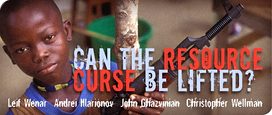I agree with John Ghazvinian’s claim that Teodoro Obiang deserves to be punished for his tyrannical rule over the citizens of Equatorial Guinea. Indeed, given that these citizens are obviously in no position to do so themselves, Obiang strikes me as an ideal candidate for international criminal prosecution and punishment. But one can concede all of this without denying Wenar’s core point that Obiang has no valid title to the country’s oil deposits, and thus one should not buy oil from him. It seems to me that the very same reasoning that the American government has invoked to prohibit American companies from buying oil from the regime in Khartoum applies to Obiang. As a consequence, we ought not to be buying stolen oil from Obiang, and (as Ghazvinian points out) the Russians would be justified in putting tariffs on our exports as long as we do. Thus, like Ghazvinian, I suspect that the logic of Wenar’s reasoning might well lead to a proliferation of tariffs. But it is not clear to me that this constitutes a reductio of Wenar’s position. If there are multiple countries buying stolen resources from illegitimate rulers, then why not have multiple tariffs designed to repay the various victims of the initial thefts?
Multiple Thefts, Multiple Tariffs
Also from this issue
Lead Essay
- We All Own Stolen Goods — and How Defending Property Rights Can Help the World’s Most Oppressed People by Leif Wenar
Developing countries with massive oil or mineral reserves are often wracked by corruption and strife as their would-be rulers jockey for control of the resources that can make them immensely wealthy. But these resources, argues political philosopher Leif Wenar in this month’s provocative lead essay, belong to the people of these countries — some of the poorest people in the world — not their rulers. So trade in these resources amounts to trade in stolen goods. Wenar argues that we must “enforce property rights directly” by taking “legal action in U.S. jurisdictions against the middlemen who trade Americans’ dollars to the worst regimes in exchange for stolen resources.” Because this cannot stop “resource cursed” countries from trading with less enlightened countries, such as China, Wenar additionally proposes a tariff on imports from China (or from whatever country is receiving “stolen” resources), the proceeds of which are to be held in trust for the rightful owners of the resources, and disbursed to those people in the event of their government’s reform. “The priority in reforming global trade,” Wenar argues, “must be to lock in the rights that define the market order. The first step in improving the prospects of poor people is to enforce the rights they already have.”
Response Essays
While lauding the goal of Leif Wenar’s proposal for fighting the effects of the resource curse, John Ghazvinian, author of Untapped: The Scramble for Africa’s Oil, questions its practicability. When it comes to determining which governments meet the threshold of a “minimally decent and unified government,” Ghazvinian worries about the possibility that “this process will become deeply politicized” or “simply reduced to who has the best PR apparatus.” Ghazvinian suggests that requiring a government to be unified, though intended to stave off civil war, may “have the opposite effect” by providing “any aggrieved minority the power of an instant veto-risking destabilization in what are often already unstable countries.” Wenar’s “anti-theft” tariff, Ghazvinian argues, seems unlikely really to be seen as distinct from other tariffs and so will introduce just another complicating factor into the realpolitik of trade negotiation.
Washington University political philosopher Christopher Wellman praises Wenar’s proposal for fighting the resource curse, but he criticizes the idea of a “Clean Hands Trust” on the ground that it “requires too LITTLE, not too much” of those of us involved in the market for natural resources “stolen” from their rightful owners. Wellman argues that the “Clean Hands Trust” is analogous to a slave-owner attempting to rectify his wrongdoing by offering the slave a large sum in compensation. “If the slave owner cannot clean her hands by paying the slave after the fact,” Wellman asks, “then why should we presume that the person who buys slave-produced cotton from a slave owner can clean her hands by paying the slave after the fact? And if the person who buys morally tainted cotton cannot clean her hands in this way, why think that those who buy inexpensive shirts constructed from slave-produced cotton can clean their hands by subsequently reimbursing the slaves?” Similarly, he argues a Clean Hands Trust would fail really to clean our hands.
Cato senior fellow Andrei Illarionov, a former chief economic advisor to then-Russian President Vladimir Putin, argues that there is nothing special about the “resource curse,” which represents just one among many kinds of theft by corrupt political elites. According to Illarionov, Wenar fails to make a principled distinction between the actions of the political leaders of Equatorial Guinea and those of Russia that would motivate restricting trade in goods from the former but not the latter. Illarionov argues that the precedent of treating a country’s natural resources as belonging to its people is the problem, not the beginning of a solution. In practical political reality, the idea of collective national ownership of resources often translates directly into nationalization and control by political elites. Additionally, Illarionov argues that the trade sanctions Wenar proposes would punish innocent citizens who already suffer under corrupt rulers. The issue, he argues, is not a matter of what is stolen, but how we will treat those responsible for theft.

